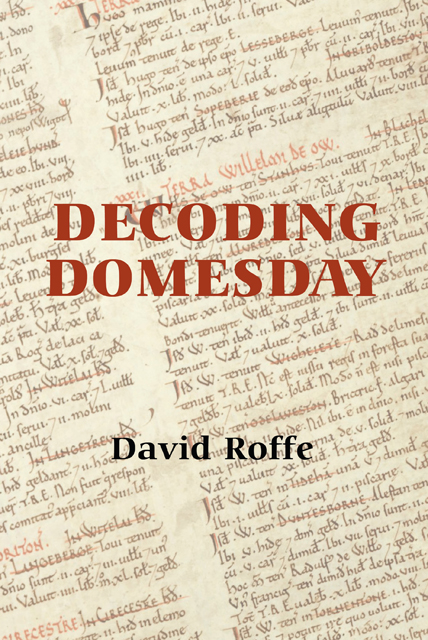Book contents
- Frontmatter
- Contents
- Tables
- Dedication
- Preface
- Acknowledgements
- Abbreviations
- 1 Domesday Past and Present
- 2 The Domesday Texts
- 3 The Inquest and the Book
- 4 The Domesday Boroughs
- 5 Lordship, Land, and Service
- 6 The Vill and Taxation
- 7 The Economy and Society
- 8 The Communities of the Shire
- 9 The Beyond of Domesday
- 10 Domesday Now
- Appendix The main entry forms of GDB
- Bibliography
- Index
10 - Domesday Now
Published online by Cambridge University Press: 10 March 2023
- Frontmatter
- Contents
- Tables
- Dedication
- Preface
- Acknowledgements
- Abbreviations
- 1 Domesday Past and Present
- 2 The Domesday Texts
- 3 The Inquest and the Book
- 4 The Domesday Boroughs
- 5 Lordship, Land, and Service
- 6 The Vill and Taxation
- 7 The Economy and Society
- 8 The Communities of the Shire
- 9 The Beyond of Domesday
- 10 Domesday Now
- Appendix The main entry forms of GDB
- Bibliography
- Index
Summary
In the preceding pagesI have been at pains to argue that the abandonment of the concept of a single purpose for the Domesday enterprise provides a better basis for understanding Domesday data. Once released from the necessity of thinking in black and white terms, it is possible to perceive processes (as opposed to quantities) that make better sense of the often apparently contradictory evidence. The result has been glimpses of a very different Anglo-Norman society and economy. In this chapter these perceptions are summarized and put into the wider context of the evolution of England from a tributary society to a feudal one. It was a transformation in which Domesday Book itself was instrumental. The fact, though, makes it all the more necessary to differentiate between what Domesday became from what it was when it was first written.
Purpose and content
The inventory school of Domesday studies draws on a long history. Contemporary sources are eloquent on the what and how of the Domesday inquest, but remarkably mute as to why. In this respect it is no different from most other medieval inquests. It is, then, not surprising that subsequent commentators fixed on its most visible product. From at least the late twelfth century the production of Domesday Book was understood as the purpose of the Domesday inquest. It was a bureaucratic process, drawn up by executive fiat. As reformulated by Round and then Galbraith, this view gave birth to an important corollary: the forms and content of Domesday are a clue to its intent. The resulting hypotheses – Domesday Book as geld survey (Round), feodary (Galbraith), social contract (Holt), tax assessment (Harvey), quartermaster's manual (Higham), even tax return (Bridbury) – have all been posited on its exhaustive scope. Content has defined purpose and purpose validated content.
The premise of all of these analyses does violence to the Domesday sources. Galbraith and his followers have produced a complex taxonomy of the Domesdaytexts which purports to prove that the production of the book was the aim of the Domesday inquest. But, as we have seen, this is nothing more than wishful thinking.
- Type
- Chapter
- Information
- Decoding Domesday , pp. 306 - 319Publisher: Boydell & BrewerPrint publication year: 2015
- 2
- Cited by



